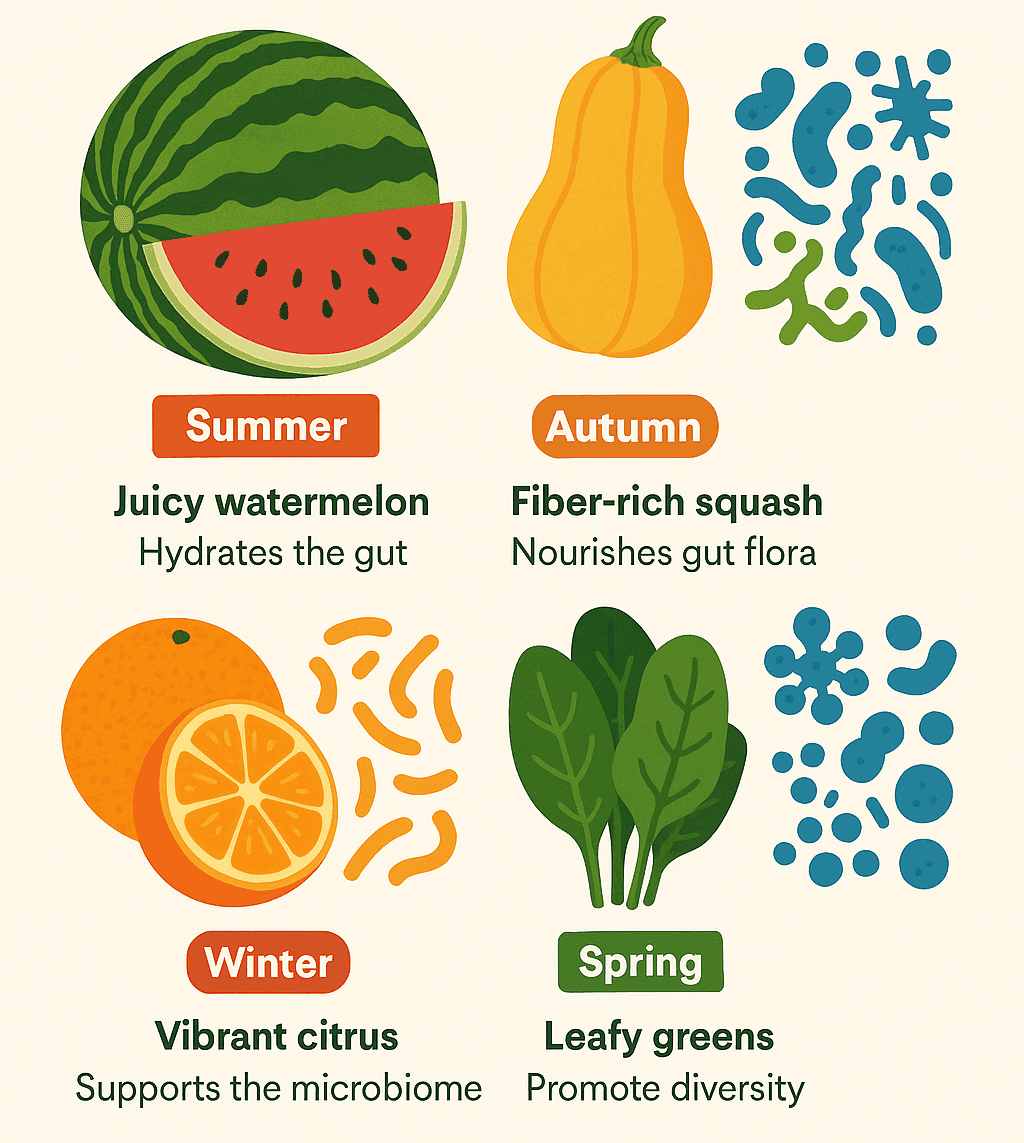Why Your Gut Wants You to Eat Seasonally
These days, thanks to supermarkets and cold storage, we can eat strawberries in the middle of winter or bite into apples way before they’re in season. It’s definitely convenient, and maybe even exciting to have our favorite fruits available all year round. But when it comes to gut health, this modern habit might not be doing us any good. Choosing to eat seasonally, picking foods that naturally grow and ripen during specific times of the year isn’t just a trend or an environmentally friendly choice. It’s actually something that supports our body on a deeper, biological level. Our gut which is home to trillions of beneficial bacteria, has evolved to develop well with the natural shifts in seasonal produce.
What Is Seasonal Eating?
Seasonal eating refers to choosing fruits and vegetables that naturally grow and are harvested during specific times of the year in your area. Think of enjoying juicy mangoes during the summer, savoring pumpkins in the fall, or incorporating fresh leafy greens into your meals during winter. Long before the days of modern refrigeration and imported produce, this was how people ate. Today, it’s a more intentional choice, one that supports both our health and the environment.
The Gut Microbiome: A garden inside our body

Our gut is home to a vast community of microbes that play a huge role in all the processes of the body from digestion and immunity to our mood and even the condition of our skin. While many factors influence this microbial world like our genes, lifestyle, hormones and medications, the biggest influence is what we eat i.e., the diet we maintain . Interestingly, just like nature changes with the seasons, our gut ecosystem shifts too. According to research, the gut microbiome is not static, it reacts to seasonal changes in our diet, much like a garden reacts to different seasons throughout the year .
Seasonal Food = Seasonal Microbes
One of the most fascinating things I’ve come across is how traditional diets especially in indigenous or rural communities naturally include a wide variety of seasonal foods. Interestingly, research shows that in these populations, the composition of gut bacteria is not static; it actually changes throughout the year depending on what’s available to eat. . For example, in hunter-gatherer communities like the Hadza of Tanzania, the microbiota diversity and richness increases during certain times of the year especially on consumption of fiber-rich foods. This seasonal shift feeds different types of beneficial bacteria, helping to maintain a balanced and resilient gut. When we consume a monotonous, non-seasonal diet, we limit microbial diversity, a factor associated with increased risks of inflammatory and metabolic disorders .
Why your gut loves seasonal produce
Here are some of the beneficial effects of eating seasonally on the gut microbiome , it not only nourishes the gut but also provides the overall nutritional requirements to the body :
More variety means a Healthier microbiome:
With each season, nature offers a fresh mix of fruits and vegetables, each loaded with different types of fiber, natural compounds, and nutrients. For example, summer brings in hydrating foods like watermelon and cucumber,and juicy fruits like mango. While, autumn offers hearty root veggies like potatoes and carrots that are packed with resistant starch. During winter, we see citrus fruits and leafy greens, rich in vitamin C and folate. This seasonal rotation helps feed a wider variety of gut bacteria, which is essential for keeping our microbiome diverse and balanced.

Natural Immune Boost:
Our gut and immune system are closely connected, and the food we eat can directly influence how well we fight off infections or allergies. Seasonal fruits and vegetables contain bioactive compounds that support our immune system right when we need it the most . These compounds modulate immune responses during flu-prone seasons or allergy periods.
Aligning with the Body's Natural Rhythm:
Just like our bodies have their own internal clock , our gut microbiota has its own rhythm. These rhythms are influenced by light exposure, food intake, and hormones, all of which change seasonally. According to research, eating in tune with these natural cycles can help your gut microbiota stay in sync with the rest of your body, supporting everything from digestion to mood regulation.
Seasonal diets and Fermented Foods
Many traditional seasonal diets naturally include fermented foods based on seasons which include:
- Summer: Summer is a time for lighter, cooling fermented foods like kimchi, sauerkraut and kombucha. Some fermented foods popularly consumed among the people of South India include dosa and idli.
- Winter: Winter is associated with lighter, warming fermented foods like miso, tempeh, and sourdough bread. These foods can provide sustained energy and support the body during colder months.
- All seasons : Fermented foods like yogurt, kefir, and cheese can be enjoyed all year round and offer benefits for gut health and digestion.
What If Seasonal Eating Isn’t Always Possible?
Living in a city or in areas where fresh, local produce isn’t always accessible can make seasonal eating a bit tricky. But that doesn’t mean you’re out of options. There are still plenty of smart ways to support your gut health:
- Go for frozen produce – These are usually harvested at their seasonal peak and quickly frozen, locking in nutrients and freshness.
- Include dried or fermented foods – Think dried berries, sun-dried tomatoes, or traditional ferments like kimchi or pickles. These not only last longer but are great for your gut too.
- Keep your meals diverse – Even if it’s not perfectly seasonal, try to rotate your ingredients every couple of weeks. This variety helps feed different kinds of beneficial gut bacteria.
Conclusion: Let Your Gut Flow With the Seasons
In today’s world, where processed foods are everywhere and every fruit seems to be available all year round, eating with the seasons might feel like a small or old-fashioned choice. But the truth is, it’s a simple habit that can make a huge difference. Eating seasonally helps boost the diversity of our gut microbes, keeps our bodies in sync with nature’s rhythms, and brings us back to a way of living that’s more balanced and intuitive. Our gut isn’t meant to process the same repetitive foods day in and day out. It develops and grows on the availability of seasonal fruits and vegetables that offer a variety of nutrients and fibers. When we embrace this natural variety, we’re not just feeding ourselves, we're feeding an entire ecosystem inside us.
-Reema Jyothi Sequeira
References
Chambers, E. S., Viardot, A., Psichas, A., Morrison, D. J., Murphy, K. G., Zac-Varghese, S. E., ... & Frost, G. (2019). Effects of targeted delivery of propionate to the human colon on appetite regulation, body weight maintenance and adiposity in overweight adults. Gut, 64(11), 1744-1754. https://doi.org/10.1136/gutjnl-2014-307913
Davenport, E. R., Mizrahi-Man, O., Michelini, K., Barreiro, L. B., Ober, C., & Gilad, Y. (2014). Seasonal variation in human gut microbiome composition. PLoS One, 9(3), e90731. https://doi.org/10.1371/journal.pone.0090731
Heiman, M. L., & Greenway, F. L. (2016). A healthy gastrointestinal microbiome is dependent on dietary diversity. Molecular Metabolism, 5(5), 317-320. https://doi.org/10.1016/j.molmet.2016.02.005
Smits, S. A., Leach, J., Sonnenburg, E. D., Gonzalez, C. G., Lichtman, J. S., Reid, G., ... & Sonnenburg, J. L. (2017). Seasonal cycling in the gut microbiome of the Hadza hunter-gatherers of Tanzania. Science, 357(6353), 802-806. https://doi.org/10.1126/science.aan4834
Thaiss, C. A., Zeevi, D., Levy, M., Zilberman-Schapira, G., Suez, J., Tengeler, A. C., ... & Elinav, E. (2016). Transkingdom control of microbiota diurnal oscillations promotes metabolic homeostasis. Cell, 159(3), 514-529. https://doi.org/10.1016/j.cell.2014.09.048